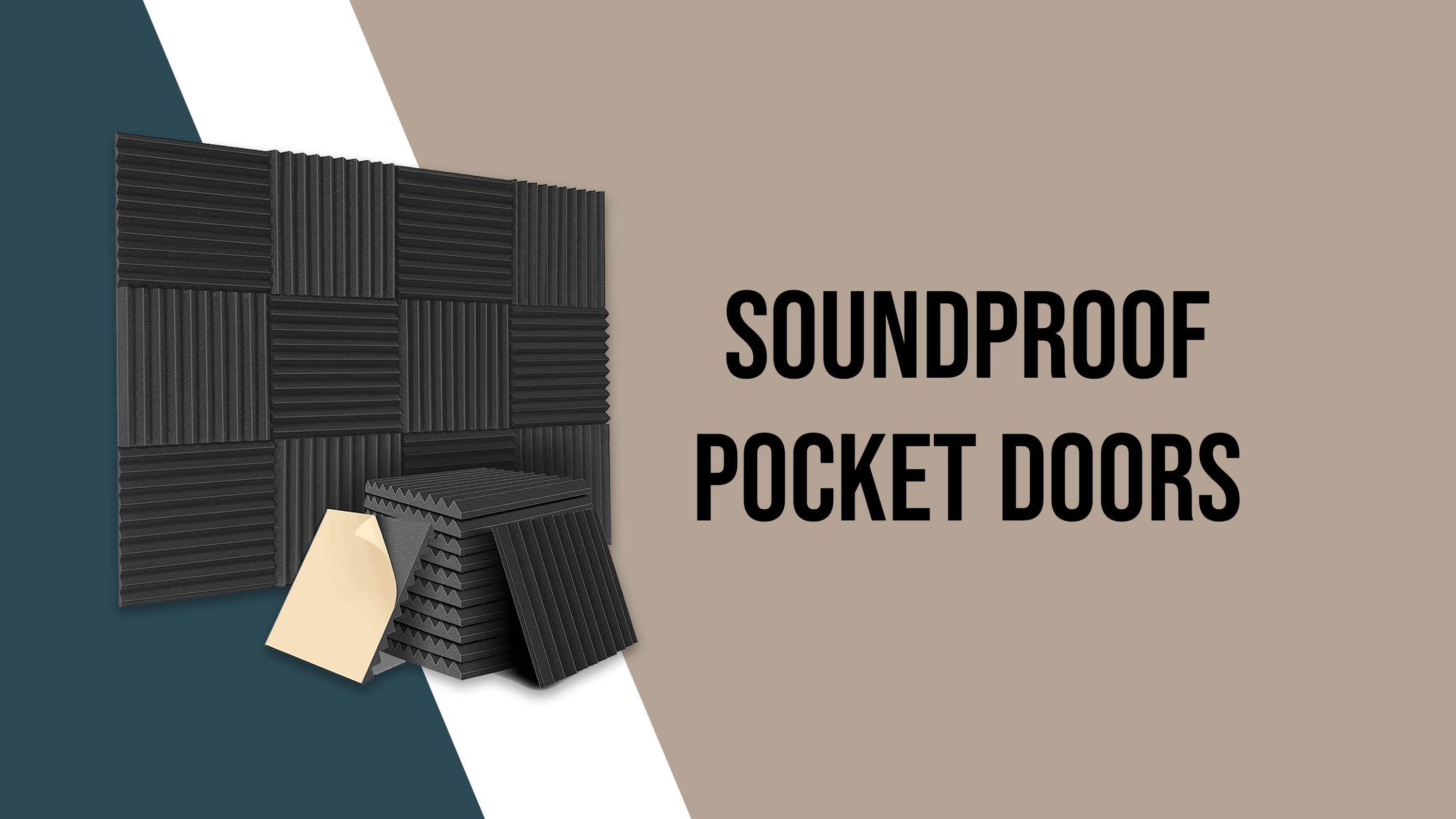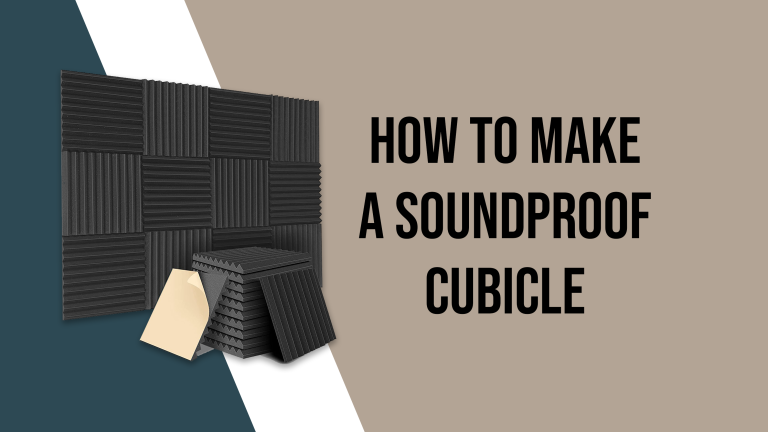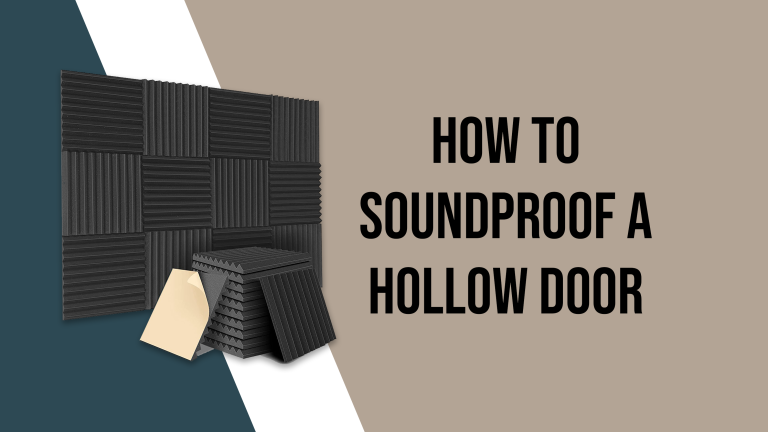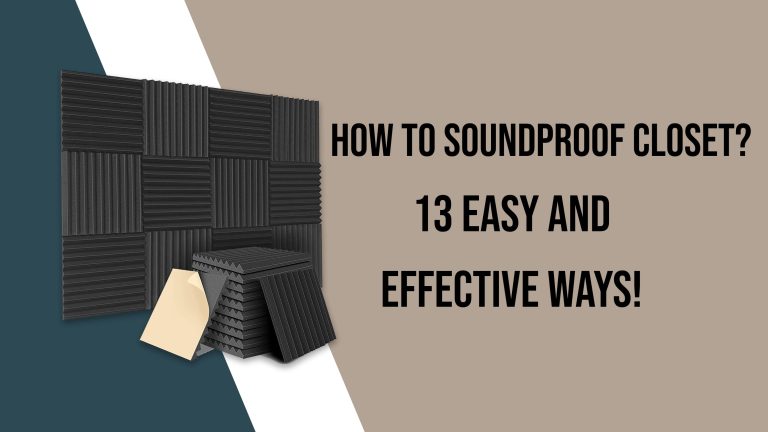Soundproof Pocket Doors: Pocket Doors That Hush
Soundproof pocket doors are becoming increasingly popular due to the rise in demand for peaceful living spaces.
In today’s world, noise pollution is a growing problem, and people are looking for solutions to reduce the amount of noise they are exposed to.
Pocket doors are an excellent solution to this problem, as they are an excellent way to soundproof your home, office, or other living space.
You often soundproof:
- Barn Door
- Hollow Door
- Closet
- Drop Ceiling
- Hotel Rooms
- Hurricane Windows
- Baby Room
- Basement
- Mobile Home
- Apartment
- Floor Tiles
- Dog Crate
Soundproof Pocket Doors
They typically consist of a soundproof material, such as a dense core or multiple layers of soundproofing material, and may also include seals and gaskets to help prevent sound from leaking through gaps and seams. Installing a soundproof pocket door involves removing the old door, preparing the wall, installing the pocket door hardware, installing the soundproof pocket door, and trimming the door to fit the wall.
Step-by-Step Guide
Remove the Old Door:
The first step in installing your soundproof pocket door is to remove the old door. This may involve removing the hinges, frame, and trim. If the old door was not a pocket door, you may need to remove the drywall to create the pocket.
Prepare the Wall:
Next, you will need to prepare the wall for the pocket door. Use a stud finder to locate the studs in the wall, and then use a level to ensure that the wall is straight. If the wall is not straight, you may need to shim it to ensure that the pocket door is level.
Install the Pocket Door Hardware:
Once the wall is prepared, you can start installing the pocket door hardware. This typically includes a track, rollers, and guide. Follow the manufacturer’s instructions for installing the hardware, and make sure that it is level and securely attached to the wall.
Install the Soundproof Pocket Door:
After the hardware is installed, you can start installing the soundproof pocket door. Make sure that the door is properly aligned with the hardware, and then secure it in place with screws and anchors.
Trim the Door:
Finally, you will need to trim the door to fit the wall. Use a saw to trim the door to the desired size, and then install the trim to cover any gaps or seams.
What are Soundproof Pocket Doors?
Soundproof pocket doors are a type of sliding door that is designed to block out noise. They are designed to be installed into a wall cavity and slide into the wall when not in use, hence the name “pocket door”. Soundproof pocket doors are made from materials that are designed to absorb and block out noise, such as heavy-duty, soundproof glass or solid wood. These doors are an excellent option for anyone looking to improve the soundproofing of their living space.
Advantages of Soundproof Pocket Doors
Space-Saving:
One of the biggest advantages of soundproof pocket doors is that they save space. As they slide into the wall when not in use, they do not take up any floor space, which is a great advantage in smaller living spaces.
Improved Soundproofing:
Soundproof pocket doors are an excellent solution for anyone looking to improve the soundproofing of their living space. They are designed to block out noise, making them ideal for bedrooms, offices, and other spaces where peace and quiet are important.
Aesthetically Pleasing:
Soundproof pocket doors come in a range of styles and finishes, making them an attractive addition to any home or office. They are available in a variety of materials, including glass, wood, and metal, so you can find a door that matches the style of your living space.
Increased Privacy:
In addition to improved soundproofing, soundproof pocket doors also offer increased privacy. They are an excellent solution for anyone looking to create private spaces in their home or office, such as a study or home office.
How to Choose the Right Soundproof Pocket Door
Consider the Purpose:
The first step in choosing the right soundproof pocket door is to consider the purpose of the door. If you are looking to improve the soundproofing of your living space, a solid wood or heavy-duty glass door may be the best option.
Measure the Space:
Before purchasing a soundproof pocket door, you will need to measure the space where the door will be installed. This will ensure that you purchase a door that fits properly and provides the desired level of soundproofing.
Consider the Style:
Soundproof pocket doors come in a variety of styles, so it is important to choose a door that matches the style of your living space. Consider the overall look and feel of your home or office, and choose a door that complements the space.
Budget:
Soundproof pocket doors can be expensive, so it is important to consider your budget when choosing a door. Make sure to shop around to find the best deal, and consider purchasing a door that is made from high-quality materials, as this will provide better soundproofing and last longer.
How does an acoustic pocket door work?
An acoustic pocket door is a special type of pocket door that is designed to reduce sound transmission between rooms. It works by incorporating soundproofing materials and techniques into the door construction to reduce the amount of sound that passes through the door. Some common soundproofing materials used in acoustic pocket doors include mass loaded vinyl, soundproof foam, and multiple layers of dense core materials.
Additionally, the door may have a seal around its perimeter to prevent sound from passing through gaps or seams in the door frame. The design and construction of acoustic pocket doors are optimized to provide maximum sound reduction, making them an ideal solution for homes, offices, or other spaces where sound privacy is a priority.
Are Pocket Doors Soundproof?
No, pocket doors are not soundproof. The cheap, thin, and sliding doors block very little sound, If you have a pocket door installed as the main door of a bedroom or a workspace, don’t expect it to block out external noise. You’ll hear everything happening around you and those outside the room will hear everything being said inside the room.
That’s why if you’re looking for privacy, pocket doors are not the best choice.
However, there is a very simple solution to this loud problem of pocket doors. Soundproofing pocket doors is very much possible. Read on to find out how you can soundproof pocket doors.
How To Soundproof Pocket Doors?
Pocket doors are not very thick and have plenty of gaps from where sound can escape. If you don’t want to invest in a hinged door but still want to reduce the sound conduction of your pocket door, your only option is soundproofing.
Here are a few methods of soundproofing a pocket door:
Switch To A Solid Core Pocket Door:
Doors with a hollow core can not block sound waves. Sadly, most pocket doors have a hollow core. If you want to use a pocket door for noise reduction, your best bet is to switch to a solid-core pocket door. This will make the door heavier and improve soundproofing as well.
Insulate With Sound Dampening Materials:
A pocket-friendly method of soundproofing a pocket door is to insulate it with sound-dampening material like acoustic foam, acoustic caulk, or mass-loaded vinyl. These materials are great at absorbing sound waves.
Fill The Gaps:
Use weather stripping or soundproofing rubber to cover all the gaps around your pocket door panel. Sound waves can escape through the tiniest of gaps and covering them up can reduce sound conduction.
That’s how to soundproof a pocket door by yourself. Some of these methods create better soundproofing than others. That’s why it’s important to consider your purpose before choosing a soundproofing method for your pocket door.
How To Soundproof a Barn Door?
Both pocket and barn doors serve the same purpose. Both are sliding doors that can help save a lot of space. The only difference is that barn doors do not hide inside walls. In other words, whether open or closed, a barn door is always visible.
Much like pocket doors, barn doors are also quite hollow. That means they won’t block much noise from coming in or going out. However, if you are interested in barn doors, there is a solution- barn door soundproofing.
Get A Solid Core Barn Door:
A barn door made out of solid wood is much better at stopping sound than a hollow core door. It will cost a bit more, but a solid core is sturdier, thicker, and much better at sound absorption.
Use Acoustic Foam:
If you don’t want to invest in a solid core door, you can also fill the core or insulate the door with acoustic foam. Putting the foam on the outside will affect the aesthetic look of the door but it does wonders for soundproofing.
Conclusion
Installing soundproof pocket doors can be a simple and straightforward process with the right tools and a bit of know-how. By following these steps, you can install your soundproof pocket door with confidence and enjoy the improved soundproofing and increased privacy that it provides.
FAQ’s
How do you soundproof a sliding pocket door?
To soundproof a sliding pocket door, you can add soundproofing materials such as weather stripping, door sweeps, door seals, or gaskets around the door frame. You can also use a dense core door or a door with multiple layers of soundproofing material. Additionally, you can install soundproof door sweeps at the bottom of the door and weather stripping around the edges to prevent sound from leaking through gaps and seams.
How do soundproof doors work?
Soundproof doors work by using materials that are effective at reducing the transmission of sound. This may include dense cores, multiple layers of soundproofing material, seals and gaskets, and other noise-reducing features. By preventing sound from passing through gaps, seams, and other openings in the door, soundproof doors effectively reduce the amount of sound that enters or leaves a room.
What is the purpose of a pocket door?
The purpose of a pocket door is to provide an efficient and space-saving solution for doorways. Pocket doors slide into a pocket in the wall, allowing them to be tucked away when not in use. This frees up valuable floor space and can be especially useful in smaller rooms or spaces where a traditional swinging door may not fit.
What type of door is most soundproof?
The most soundproof doors are typically those that are made of dense materials and have multiple layers of soundproofing material. For example, solid wood doors, metal doors, and doors with multiple layers of solid core materials are often more effective at reducing sound transmission than lightweight hollow core doors.
Can a pocket door be soundproof?
Yes, a pocket door can be soundproof. To make a pocket door soundproof, you can add soundproofing materials such as weather stripping, door seals, or gaskets around the door frame. You can also use a dense core door or a door with multiple layers of soundproofing material. Additionally, you can install soundproof door sweeps at the bottom of the door and weather stripping around the edges to prevent sound from leaking through gaps and seams.
Are pocket doors as soundproof as regular doors?
The soundproofing qualities of a pocket door can vary depending on the materials and construction techniques used. However, with the right materials and techniques, a pocket door can be just as soundproof as a regular door.
Are pocket doors private?
Pocket doors can offer increased privacy compared to traditional swinging doors. Because they slide into a pocket in the wall, they are less likely to leave gaps or seams that may allow sound or light to pass through.
Are pocket doors more expensive than regular doors?
The cost of a pocket door can vary depending on the materials and construction techniques used. In some cases, pocket doors may be more expensive than traditional doors due to the added hardware and installation requirements. However, the space-saving benefits of a pocket door can offset the increased cost in some situations.
Can sliding doors be soundproof?
Yes, sliding doors can be soundproof. To make a sliding door soundproof, you can add soundproofing materials such as weather stripping, door seals, or gaskets around the door frame. You can also use a dense core door or a door with multiple layers of soundproofing material. Additionally, you can install soundproof door sweeps at the bottom of the door and weather stripping around the edges to prevent sound from leaking through gaps and seams.
Can pocket doors be soft close?
Yes, pocket doors can be designed with soft close mechanisms to prevent them from slamming shut. Soft close mechanisms work by slowing down the closing speed of the door and gently lowering it into place.
Can pocket doors be airtight?
Airtightness in a pocket door can depend on several factors, including the materials used, the quality of the installation, and the presence of any gaps or seams. To improve airtightness in a pocket door, you can install weather stripping, door seals, or gaskets around the door frame to prevent air from passing through gaps and seams.
Additionally, you can use a dense core door or a door with multiple layers of soundproofing material to prevent air from passing through the door itself.








